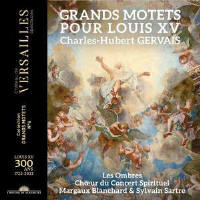|
Texte paru dans: / Appeared in: |
|
|
Outil de traduction |
|
|
A contemporary and sometime colleague of André Campra and heir to Michel-Richard de Lalande, Gervais (1671-1744) follows in the footsteps of Rameau, Mondonville and Pierre Robert as the latest Baroque composer in the spotlight for the Château de Versailles’ ongoing series of Grands motets. Period ensemble Les Ombres supply the colourful instrumental forces, joining the choir of Le Concert Spirituel and a handful of soloists under the direction of Sylvain Sartre. Booklet notes by Jean-Paul Montagnier speak of the composer’s ‘solid sense of drama’, but it’s the solidity rather than the drama that’s on display here in this sequence of attractive but conservative motets. Super flumina Babilonis, with its evocative, penitential text, offers perhaps the greatest dramatic opportunities. Willows weep in a pair of flutes, who sob gently in the background of the exquisite hautecontre aria ‘In salicibus in medio eius’ (beautifully floated by Nicholas Scott), echoed subsequently in the flexible arabesques of paired soprano voices (Marie Perbost, Déborah Cachet) in ‘Et qui abduxerunt nos’. But ultimately the difference between this sorrowful landscape and the unclouded rejoicing of Jubilate Deo isn’t that marked. Both motets share a wonderfully characterful solo bassoon (Jérémie Papasergio), who all but steals the show in the latter’s ‘Scitote quoniam’ and the Miserere’s brooding baritone aria ‘Sacrificium Deo’, as well as solo arias that are consistently more varied and inventive than the choral episodes. The ‘Auditui meo’ – a rare ensemble for solo voices – is the highlight of the extended Miserere setting, along with the descriptive rising soprano scales that open the finale ‘Ut aedificentur’. Sartre’s direction gives us crisp, wellbalanced accounts, personality fostered by a pleasantly reedy quality in both orchestra and choir. But it’s elegance, not drama, that’s the watchword here.
|
|




